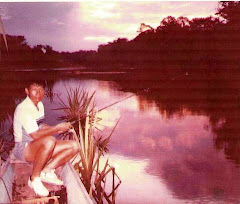KUALA LUMPUR: When the remains of 21 Iban warriors make their final journey home to Sarawak sometime this year, one of the country's most highly decorated soldiers is likely to weep with relief.
For the past 20 months, retired Lt Kol Robert Rizal Abdullah has been on an emotional mission - ever since he read the plea of a Sarawakian woman who saw a blog about the grave of an Iban tracker being at a roadside in Alor Setar.
"My heart bled when I saw the picture. I vowed to take the matter up to the highest authority. It became my mission," Robert Rizal wrote in his own blog (http://pgbwarrior/blogspot.com).
The task was code-named Ops Ngerapuh - an Iban word which means ‘moving the remains of the dead’.
In an interview with Bernama, Robert Rizal, 61, said that, for a while, Ops Ngerapuh appeared to have stalled.
"But it is moving now. I am confident that this will be done by this year, we are trying by September, but it will be this year," said the retired soldier who is working with the defence ministry and the Sarawak Government on this. "A site has been identified in Kuching but I also heard that there are some bidders for the land because it is in a prime area," he said.
The 15.4 acre (6.2 hectare) plot of government land is located in Kota Sentosa, amid several army camps at the 7th mile of the Kuching-Serian road.
Robert Rizal was formerly Robert Madang Langi, an Iban warrior himself who received the Panglima Gagah Berani medal, the nation's second highest military gallantry award, after a courageous attack on communist terrorists in 1973 in Sarawak during his 25 years in uniform.
Ops Ngerapuh went firmly on track after Prime Minister Datuk Seri Najib Tun Razak pledged last month to send home the remains of the warriors, who were trackers and rangers recruited by the British colonial forces.
Robert Rizal said the prime minister was informed of it by Sarawak Deputy Chief Minister Tan Sri Alfred Jabu during his visit to Kuching.
"Once the land is confirmed by the state government, a memorial will be built and, after that, the exhumations can be done easily," he said.
Robert Rizal said that, of the 21 who were all killed in action between 1951 and 1963, when the country first declared emergency to fight communist guerillas, only the remains of 12 were known. The whereabouts of the rest are unknown.
Four are buried at the Batu Gajah Christian cemetery, two in the Kamunting Road Christian cemetery in Taiping, another four at the Cheras Christian cemetery in Kuala Lumpur while two are interred at the Kranji Military Cemetery in Singapore.
"The names of eight are etched at the Terendak Military Camp in Malacca.
“It is the gravestone of Ungkok anak Jugam that is by the roadside in Alor Star and triggered this," said Robert Rizal.
Ungkok's gravestone was moved to the side of the road at KM4, Jalan Langgar, Alor Setar, when a dual highway was built more than a decade ago.
Robert Rizal said the gravestone was moved to the St Michael's Catholic Church cemetery, also in Alor Setar last April, and despite scanning a 100m radius, there were no bones detected in the vicinity of the original site.
He said that, so far, contact had been made with the next-of-kin of 18 of the deceased except for three - Private Empati anak Dugu, Private Letan anak Kusing and Border Scout Utot anak Tangang.
Discussions would be held with the families on how their warrior heroes would be re-buried.
"Some of the families have converted to Islam, there are some who are Christians and some still pagans. We will follow their wishes," said Robert Rizal.
Traditional Ibans use the 'miring' ceremony to ward off bad spirits and bad luck and such a ceremony was performed when Ungkok's gravestone was shifted.
"I am doing this for the future generations of Ibans so that the sacrifices of their forefathers and what they had done is remembered and is handed down as a legacy for young Ibans," said Robert Rizal, who has four grandchildren.
He resides in Taiping with his wife, Raja Noriah Raja Shahrome, a great grand-daughter of Sultan Abdullah who once ruled Perak. - Bernama













